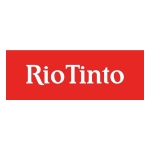MELBOURNE, Australia--(BUSINESS WIRE)--Rio Tinto chief executive J-S Jacques said “Covid-19 is a human tragedy and we all have to play our part as the pandemic spreads. Rio Tinto’s first priority remains the health and safety of all of our employees and communities. During these uncertain times, we continue to deliver products to our customers supported by our global sales and marketing teams.
“We have taken extensive measures across the business to help protect our people and communities, and have increased these as the pandemic spreads, in line with guidance or directives from governments and advice from international health organisations on best practice.
“At this point in time, most of our assets continue to operate, with health and safety as a first priority, and I am proud of the way our employees have risen to the challenge to keep themselves, their colleagues and communities safe. There are many examples of our operational teams continuing to run their businesses as they provide support to local communities, from manufacturing hand sanitiser, to giving protective equipment to hospitals and funding local community response initiatives. In order to support global grassroots community Covid-19 preparedness and recovery, we are pledging a further $25 million. This takes our total estimated voluntary global community contributions to around $60 million for 2020.
“For us the focus is to maintain a business as usual approach with many safeguards, at a very unusual time. We are not at all complacent. Safety and health comes first as we keep delivering for our customers, our host governments and communities”.
Working with our customers and business continuity
Rio Tinto continues to work with its customers to fulfil orders and meet their requirements while complying with government directives. The company’s commercial teams in their key locations are focussing on business continuity and customer support. In most of these locations the teams are running rotating work arrangements or working from home, with the Shanghai team returning to the office today as China recovers from the pandemic.
Rio Tinto has business resilience teams (BRTs) at each site and region, including a global BRT under the leadership of its chief executive, J-S Jacques. The aim of these teams is to keep operations running safely, to enable commercial supply chain continuity and plan for future eventualities under various scenarios. Critical infrastructure at each of the operations has been assessed with a continuity plan in place, should it be required.
Many functional leadership teams across Rio Tinto have also been split into red and blue teams to maintain resilience and continuity, with a priority to protect critical operations support teams such as employees running the operational centres in Perth, Brisbane and Bagotville and our information technology and cyber security teams.
Protecting employees
Rio Tinto has put strict protocols in place globally, in line with government guidance and directives, and advice from leading medical experts to keep employees, contractors and partners safe.
The majority of Rio Tinto’s employees work at operations and cannot work from home, so the company has implemented a number of controls to support them which include but are not limited to:
- Introducing travel restrictions: restricting the amount of Fly-In Fly-Out (FIFO) people at sites and implementing changes to rosters where possible; implementing temperature and other rapid screening tests of workforce at airports, in alignment with local regulation and guidance; reducing the number of flights to FIFO assets due to roster changes; and implementing screening questionnaires and hotlines which provide employees with health assessments by medical advisors on fitness for work, including fatigue management.
- Implementing social distancing protocols: reducing the number of people attending pre-start meetings; keeping at least six feet apart; closure of all bars, gyms and pools at mining camp sites to limit social interaction; bus, light vehicle and flight configurations changed to extend the distance between passengers; and site meeting rooms marked with a maximum number of participants.
- Increasing personal hygiene at our assets: implementing controls for personal hygiene including hand washing prior to entering dining rooms; buffet-style food services in some operations have been eliminated or modified; increased frequency of cleaning at high touch areas; and providing extra hand sanitiser and work station cleaning areas.
- Increasing support for our employees at our sites: providing an on-call service for employees to return home for health or family emergencies; supporting employees’ mental health with the provision of our employee assistance programme; isolation areas identified and site protocols established; and medical teams in place with temporary clinics prepared.
- Increased leadership presence on site: visible local leadership across our assets, with increased communications.
A number of Rio Tinto regional and corporate offices have been shut and employees have been instructed to work from home, as per government protocols in each jurisdiction. In recognition that schools and day cares are closing, or have closed, Rio Tinto is providing flexible work arrangements to support affected employees and their families. The company is also offering mental health services for all of its teams working across the world.
Across the company, engagement with employees has been increased. A number of new communication channels utilising technology have been implemented.
Protecting host communities
Rio Tinto aims to keep communities safe by doing what it can to not put them at risk.
Rio Tinto employees and contractors cannot visit vulnerable communities – those in which underlying health challenges are prevalent, or those in remote areas where health care infrastructure is not strong – without the express approval of appropriate community and Rio Tinto leadership. Employees from such communities have been provided with support to return to their community. Feedback received from communities is being actively incorporated into local planning and approach guidelines, and Rio Tinto is offering support to those who need help preparing or communicating emergency plans.
Rio Tinto invested around $197 million1 in traditional landowner agreements and community contributions in 2019, including $36 million in voluntary community programs. The company will maintain a similar level of investment in 2020, recently announcing an extension of its $15 million Royal Flying Doctors partnership to support health for remote communities in Western Australia, as one example. In order to support global grassroots community Covid-19 preparedness and recovery, we are pledging a further $25 million. This takes our total estimated voluntary global community contributions to around $60 million for 2020. This additional investment will predominantly focus on value-in-kind opportunities.
Some of these measures are well progressed, and include:
- The supply of masks and protective equipment to support emergency and health professionals
- Donations to national and local communities, hospitals and international agencies
- Provision of ventilation units and temporary medical units in communities
- Further investment in education and financial literacy programs, as remote learning becomes the global norm for children. The Future Minds accelerator partnership Rio Tinto announced is a good example of this.
- The manufacturing of hand sanitiser at certain Rio Tinto sites
Working across the industry and with governments
Rio Tinto continues to look for opportunities to share knowledge of response activities and to partner with others in the industry to find joint solutions to address and aid in the recovery from this global pandemic. The company is actively contributing to Covid-19 related best practice forums in health, safety and communities, as established by the International Council of Mining and Metals (ICMM).
Rio Tinto is working closely with governments around the world to ensure its operations can continue to contribute to society at this challenging time. In 2019, Rio Tinto’s global direct economic contribution was around $45 billion which includes salaries, payables to governments, payments to suppliers, non-government royalties and other, reinvestments and dividends and finance items.
For further information on our Covid-19 approach visit riotinto.com, where a number of other Covid-19 market disclosures are available. Rio Tinto will continue to provide further market updates as required.
1 This includes landowners, including indigenous peoples with whom we make agreements, development contributions and voluntary community investments.
Contacts
Follow @RioTinto on Twitter
Media Relations, United Kingdom
Illtud Harri
M +44 7920 503 600
David Outhwaite
T +44 20 7781 1623
M +44 7787 597 493
Media Relations, Americas
Matthew Klar
T +1 514 608 4429
Media Relations, Asia
Grant Donald
T +65 6679 9290
M +65 9722 6028
Media Relations, Australia
Jonathan Rose
T +61 3 9283 3088
M +61 447 028 913
Matt Chambers
T +61 3 9283 3087
M +61 433 525 739
Jesse Riseborough
T +61 8 6211 6013
M +61 436 653 412
Investor Relations, United Kingdom
Menno Sanderse
T: +44 20 7781 1517
M: +44 7825 195 178
David Ovington
T +44 20 7781 2051
M +44 7920 010 978
Investor Relations, Australia
Natalie Worley
T +61 3 9283 3063
M +61 409 210 462
Amar Jambaa
T +61 3 9283 3627
M +61 472 865 948
Rio Tinto plc
6 St James’s Square
London SW1Y 4AD
United Kingdom
T +44 20 7781 2000
Registered in England
No. 719885
Rio Tinto Limited
Level 7, 360 Collins Street
Melbourne 3000
Australia
T +61 3 9283 3333
Registered in Australia
ABN 96 004 458 404
Category: general










